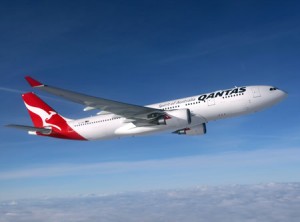
Qantas inks Solazyme algae-based biofuel deal
Australian airline Qantas has signed a deal to investigate the use of the algae-based aviation fuel developed by US company Solazyme.
The bio-products company announced late last week it would be supplying Qantas with an unspecified amount of Solajet, its microbial derived aviation fuel. The deal further underlines the company’s position as a leading player in the embryonic green jet fuel sector and follows a US Navy order of 10,000 litres of 100 per cent algal-based jet fuel for testing in aircraft.
Solazyme, backed by Morgan Stanley and Chevron among others, uses algae to break down agricultural waste into algal oil that can then be tailored to produce jet fuel. It says the full lifecycle greenhouse gas emissions of this biodiesel are up to 93 per cent lower than standard diesel.
“Through this alliance, we intend to use Solazyme’s technology platform to help provide the Australian market with renewable aviation biofuel,” said Jonathan Wolfson, chief executive of Solazyme. “We also believe this alliance is a helpful step towards the commercialisation of Solajet.”
Qantas has been active in searching for low carbon products to meet the estimated six billion litre yearly demand for aviation fuel in Australia. For example, earlier this year the airline announced plans to build a commercial-scale biofuel plant near Sydney with US bioenergy firm Solena.
Alan Joyce, Qantas’ chief executive, said the deal with Solazyme not only aligned with the company’s strategy of developing cleaner jet fuels, but could build the case for biofuel production in Australia.
“The costs and environmental impacts associated with traditional jet fuel mean it is imperative that we push hard now for the commercialisation of alternative fuel sources,” Joyce said. “We want to be at the forefront of this growing sector, which is why we have chosen to engage the most innovative companies in the field, like Solazyme.”
“We believe this is important not just for Qantas but for the Australian economy as a whole, given the global emergence of green technologies and their potential to drive growth and create jobs.”
In related news, Boeing unveiled its new 747-8 Intercontinental passenger jet yesterday, which promises 16 per cent better fuel economy, 16 per cent fewer carbon emissions per passenger and a 30 per cent smaller noise footprint than the 747-400.
Lufthansa, Korea Air and VIP customers have purchased the first 33 models, which should come into service on long-haul flights next year.
“The new 747-8 Intercontinental will set a new standard in economic and environmental performance, while providing a world-class passenger experience,” said Pat Shanahan, vice president and general manager of airplane programs at Boeing.


